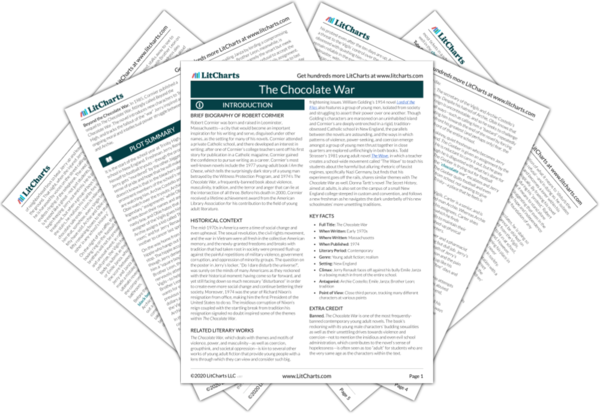It is “traditional” at Trinity High for every student to decorate the inside of his locker with a poster. In the inside of freshman Jerry Renault’s locker, there is a poster of a man walking alone on the beach. At the bottom of the poster are the words “Do I dare disturb the universe?”—a quotation from the famous long poem “The Love Song of J. Alfred Prufrock” by T.S. Eliot. The poster, then, is a symbol for the disruption of tradition. Even though in simply hanging it, Jerry is participating in a Trinity tradition, in pursuing the poster’s challenge he soon finds himself on a course that will break with tradition and isolate him from his school, his peers, and even himself.
Trinity is an environment so deeply steeped in tradition that it is nearly impossible to take an original action or strike out on one’s own. This is why Jerry’s refusal to take part in the chocolate sale is so shocking and disorienting to the rest of the student body; tradition is what keeps Trinity afloat, and without tradition, the very edifice of Trinity begins to fall apart. The school is not prestigious, or wealthy, or particularly rigorous—all it has, really, are its longstanding traditions, and by disrupting them, Jerry is committing what is in the eyes of many of his peers and teachers a grave sin. The poster, however, symbolizes that Jerry has thought long and hard—each time he opens his locker—about what it means to be a “disturbance,” and what it means to “dare” to disturb a longstanding order. The poster’s message is doubly ironic, as the tasks assigned by Archie Costello and the Vigils are themselves mostly dares; this environment in which dares are necessary in some cases and extremely taboo in others is hypocritical and inconsistent, just like many of the structures that hold up Trinity itself.
Jerry’s Poster Quotes in The Chocolate War
Jerry opened his locker. He had thumbtacked a poster to the back wall of the locker on the first day of school. The poster showed a wide expanse of beach, a sweep of sky with a lone star glittering far away. A man walked on the beach, a small solitary figure in all that immensity. At the bottom of the poster, these words appeared—Do I dare disturb the universe? By Eliot, who wrote the Waste Land thing they were studying in English. Jerry wasn't sure of the poster's meaning. But it had moved him mysteriously. It was traditional at Trinity for everyone to decorate the interior of his locker with a poster. Jerry chose this one.
“Renault."
It would be so easy, really, to yell “Yes." To say, “Give me the chocolates to sell, Brother Leon." So easy to be like the others, not to have to confront those terrible eyes every morning. Brother Leon finally looked up. The tempo of the roll call had broken.
“No," Jerry said.
He was swept with sadness, a sadness deep and penetrating, leaving him desolate like someone washed up on a beach, a lone survivor in a world full of strangers.
The morning after that first night phone call, Jerry opened his locker and shook his head in disbelief. His poster had been smeared with ink or some kind of blue paint. The message had been virtually obliterated. Do I dare disturb the universe? was now a grotesque jumble of unconnected letters. It was such a senseless, childish act of vandalism that Jerry was more awed than angered. Who'd do such a crazy thing? Looking down, he saw that his new gym sneakers had been slashed, the canvas now limp shreds, rag-like. He'd made the mistake of leaving them here overnight.
Ruining the poster was one thing, a gross act, the work of the animal—and all schools had animals, even Trinity. But there was nothing prankish about ruining the sneakers. That was deliberate, somebody sending him a message.
The telephone calls.
That attack on the football field.
Now this.
He closed the locker quickly so no one would see the damage. For some reason, he felt ashamed.
"It'll be all right, Jerry."
No it won't. He recognized Goober's voice and it was important to share the discovery with Goober. He had to tell Goober to play ball, to play football, to run, to make the team, to sell the chocolates, to sell whatever they wanted you to sell, to do whatever they wanted you to do. He tried to voice the words but there was something wrong with his mouth, his teeth, his face. But he went ahead anyway, telling Goober what he needed to know. They tell you to do your thing but they don't mean it. They don't want you to do your thing, not unless it happens to be their thing, too. It’s a laugh, Goober, a fake. Don't disturb the universe, Goober, no matter what the posters say.












